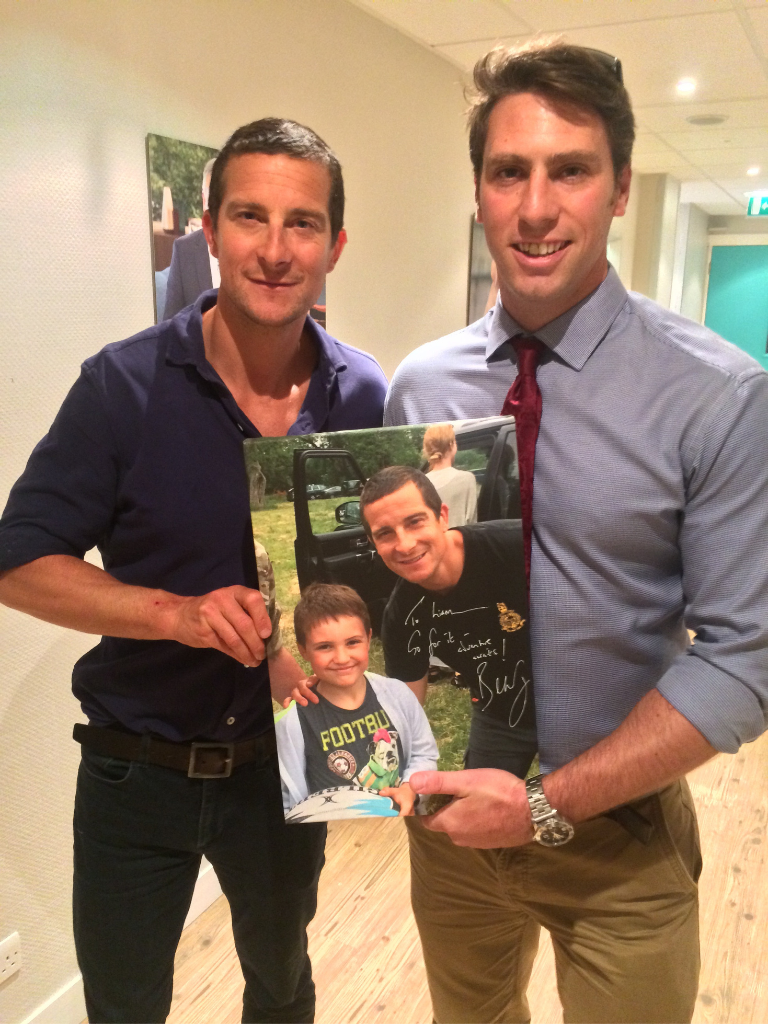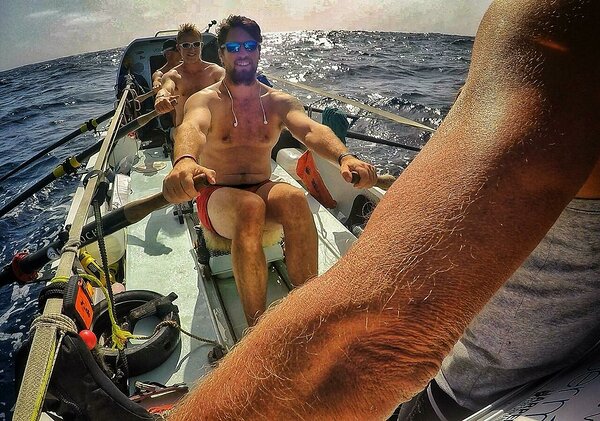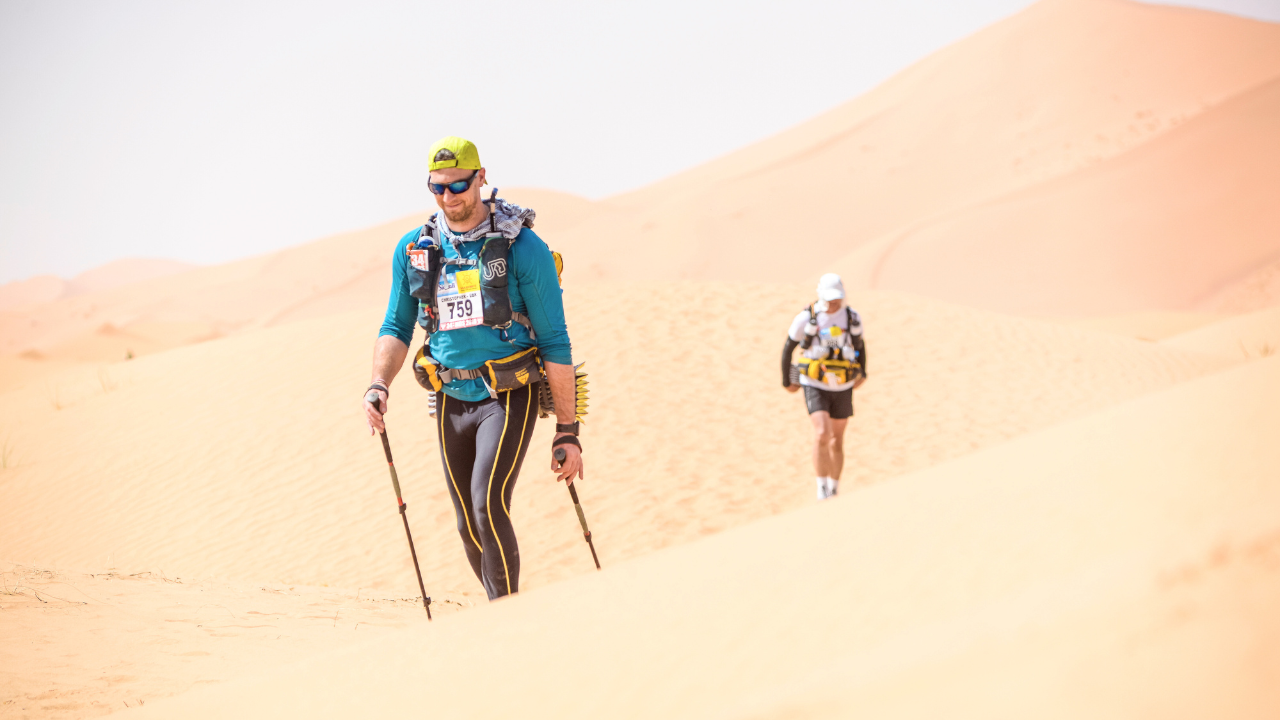
Brand designer Chris Shirley: Startups will need to become more curious about their customers
Chris Shirley is the founder of Haus of Hiatus, a branding studio that designs and markets startups and scale-ups to be successful all over the world. He is a former Royal Marines Commando officer, Military Police bodyguard, and advisor to the BBC. Besides that, he’s a Guinness World Record holder for rowing across the Atlantic Ocean and a finisher of the infamous 250-kilometer Marathon des Sables desert race. We talked to him about the changing landscape of marketing, outdoor adventures, and sports as a vehicle for social change ahead of his talk at sTARTUp Day.
This interview was written by Kerste Õunapuu, a member of the sTARTUp Day marketing & communications team.
Ostensibly, you could assume that marketers should come, but actually, it's aimed more at CEOs, CMOs, and CFOs. What I want to talk about is that there will be a significant change in how companies market themselves to potential clients in the future.
The crux of my talk is how the internet is a much more dramatic place than it was 20 years ago since you've got so many different types of social media now. Also, the amount of websites online these days has already quadrupled from what it was just five years ago. With that, it drowns out traditional company marketing efforts, such as SEO or creating content for the website to stand out. What it's leaning towards is that companies need to use a more invitational style of marketing, as in, this is our brand, this is what we stand for, this is who we are – real people, not just faceless corporations. It's going to really affect startups and scale-ups because they're the ones who will need to adapt – be more curious about their customers and their interests – to help people understand who they are and what they sell. I think curiosity is going to be a big thing.
With my experience of traveling around 65 countries and seeing and immersing myself in different cultures, I help companies figure out who their demographics are, who buys their products, and what they want to say to them. It is referred to as public funnel marketing, where you're talking about public relations, brand awareness, and brand perception. It marks the difference between a successful company and one that will flame out, which is the military term for when an engine burns out. That's precisely what a company will do if it doesn't get curious about who its customers are and why they're interested in the company.
It has that creativity where I could still do security, safety, and resilience risk consulting for clients worldwide but also work on my own ideas.
I wanted to offer something that was far more affordable. There are many ways we can do marketing better than traditional old-school studios that don't use social media and are, therefore, missing out on a huge opportunity.
I make it profitable by using social media to raise awareness of our work, which means we can offer our service the cheapest for startups – those with the least amount of money. Then, it's more expensive the bigger the organization because it provides more value for those companies.
AI has been a real game changer for us in making it cheaper this year. You could see AI as a threat because it can provide quick illustrations for a relatively low cost compared to an illustrator. But that's also an opportunity because you can get closer to what your client is looking for a lot quicker. If we've got a client who wants an image for a content article, we can quickly mock three or four different pictures in different styles. Then, they can pick from them and say which style they like best, and we can edit the image to fit exactly what they are after. All that without having to go through loads of different ideas and commissioned illustrators for each of those styles, which would have taken a month in the past.
But also, the experiences in really difficult places have helped me think about how I do things and what my company is oriented to. Over the last six years, I've been traveling to Afghanistan to work with athletes and sports teams who were using sports as a vehicle to get through the conflict that was going on between the Taliban and the coalition of nations that were deployed to Afghanistan. These sports teams were bringing people together to, for example, ride bikes or do parkour. I went over there to document it and wrote many articles about these incredible things happening in Afghanistan, but no one was taking any notice of it because they were reporting on the war that was going on there. Then my work got featured by the United Nations, the BBC, and Red Bull – huge organizations were suddenly interested in seeing more about these teams. We were able to get businesses supporting them, which was providing therapy for these young people who were experiencing the conflict, suicide bombings, and destruction around them.
I saw that sports were an indisputable unifying factor. As a youngster, mountain biking was a huge thing that gave me identity and purpose, and the same applies to those young people in Afghanistan. It just so happens that we are 3000 miles apart, but we're the same people. That made me want to set up an organization with social change at its heart. Haus of Hiatus now invests in social change projects, like funding projects in Afghanistan and sports projects around the world. We are helping the therapeutic effects of sports help young people when opportunities may not exist.
Those sports are also an excellent conversation point between different communities around the world. For instance, it helps athletes in Afghanistan connect and talk on the same level as somebody in America. That American person can then employ this person as a coder, for example, because Afghans are really good at coding, and the cost difference makes them more affordable than coders in America.
You can see this real leveling effect of introducing different cultures together and using sports as the medium that helps them overcome any differences or preconceptions. I wanted to put myself at the center of that, making sure you could create these relationships through something that's not intimidating, like bike tricks or running. That became my mission.
We've inherited this nine to five Monday to Friday pattern of working from the 20th century when people were employed to work in a factory producing something. A way of managing their output was a set amount of hours, but it doesn't reflect how much value they can bring to an organization. Nine to five in winter is very different from the same in summer - during the first, you'll want to stay somewhere warm and go into nature more during the second. I started thinking I could design my life better if I rested more in the summer months working on the Tales of Adventure website and did more website building or logo designs in winter.
Work and rest aren't bipolar things. Sometimes, I want to rest during the daytime. Especially when there are five hours of daylight in the winter in Estonia, I want to go out, cycle, and see the beautiful parts of the country. Also, I actually find it easier to work when it's dark since I can concentrate more.
It's also a platform to capture my own experiences. For example, in 2018, I rowed across the Atlantic 3000 miles; in 2019, I ran across the desert in Morocco. I found that there are probably people interested in what sleeping bag or jacket I used because they are also interested in entering something of that kind. So, I started writing articles – passing on my knowledge and experiences. Now, I try to write an article every few days, whether reviewing or suggesting practical equipment, documenting something I've done, or doing a podcast and just helping shed more light on things that I find interesting. Through it all, I can be an example for people and say, “If I did this race, why don't you have a go as well?”.
I also used it as a platform to help co-promote and highlight social causes in Afghanistan, Iraq, and places like that. These places aren't getting media attention because they are challenging to explain, but since I have seen them in real life, I decided to explain them through Tales of Adventure. It became this social drive to give a more nuanced, balanced view of my travels around the world.
I like to talk about both – big, costly, challenging projects and these sorts of things that you can do over a weekend or in an evening. It's because I find that an adventure should be something that takes you outside of your comfort zone but shouldn't always require a tremendous amount of planning or cost. Ultimately, adventures make life more vibrant and fun – when you spend a night in a tent, a difficult day at the office actually seems a lot less difficult. You could be freezing cold in a tent!
I was a security risk safety consultant while building Haus of Hiatus, reinvigorating graphic design skills and learning web design. I always had this one safe space – the consulting, which protected me in a way. It's referred to as a beachhead industry when you've got something safe that's likely to stay the same, so you can explore something new and see if that's what you want to do. I like that terminology because you get a skill under your belt that you can keep on doing if everything else fails. But you still have the confidence to try something new to see if that might keep you in front of this wave of innovation, which is trying to come behind and crash down on you.
There are 8 billion people in this world who are trying to, in a way, solve problems, so if you've got a competitive advantage, it's not going to stay for very long because people find how to do it easier, cheaper, better, more impactful than you. That’s why I take this idea of lifelong learning to heart now. I also have ambitions about things I want to do in the next 5-15 years to keep me moving, occupied, and trying new things.
Chris Shirley will give a keynote “Get Curious or ‘Flame Out’: Why Creative Curiosity is Crucial in the Era of Digital Privacy” on Day 2 of sTARTUp Day on January 26. See the full festival schedule.
You are giving a keynote titled “Get Curious or ‘Flame Out’: Why Creative Curiosity is Crucial in the Era of Digital Privacy” at sTARTUp Day on January 26. Could you give a teaser for your talk? Why is creative curiosity a vital topic, and who should come and listen to it?
Ostensibly, you could assume that marketers should come, but actually, it's aimed more at CEOs, CMOs, and CFOs. What I want to talk about is that there will be a significant change in how companies market themselves to potential clients in the future.
The crux of my talk is how the internet is a much more dramatic place than it was 20 years ago since you've got so many different types of social media now. Also, the amount of websites online these days has already quadrupled from what it was just five years ago. With that, it drowns out traditional company marketing efforts, such as SEO or creating content for the website to stand out. What it's leaning towards is that companies need to use a more invitational style of marketing, as in, this is our brand, this is what we stand for, this is who we are – real people, not just faceless corporations. It's going to really affect startups and scale-ups because they're the ones who will need to adapt – be more curious about their customers and their interests – to help people understand who they are and what they sell. I think curiosity is going to be a big thing.
Now, jumping on to your current job at Haus of Hiatus. Where did the inspiration for the design studio come from, and what is it about?
My first job outside of the military was with the BBC. It was fascinating because we had, for example, a documentary about going to the wilds of Borneo. I thought it was cool, but I hated being just the advisor – somebody reminding the team about the risks and their safety. I wanted to be more involved in the creative process since I'm more of a creative at heart. That's my background as well: I studied graphic design. When I decided to leave BBC, I set up my own creative studio.With my experience of traveling around 65 countries and seeing and immersing myself in different cultures, I help companies figure out who their demographics are, who buys their products, and what they want to say to them. It is referred to as public funnel marketing, where you're talking about public relations, brand awareness, and brand perception. It marks the difference between a successful company and one that will flame out, which is the military term for when an engine burns out. That's precisely what a company will do if it doesn't get curious about who its customers are and why they're interested in the company.
It has that creativity where I could still do security, safety, and resilience risk consulting for clients worldwide but also work on my own ideas.
How vital is it for you that what Haus of Hiatus offers is affordable to startups and scale-ups? How do you make the service affordable but also stay in profit yourself?
Having run a startup, I know how little funds they've got to spend on intangible things like marketing, logo, or website. It has to look really good but can't cost six or seven figures like some big companies have to throw around. Also, there's a cost of living crisis at the moment, as if you don't already run through money when running a business.I wanted to offer something that was far more affordable. There are many ways we can do marketing better than traditional old-school studios that don't use social media and are, therefore, missing out on a huge opportunity.
I make it profitable by using social media to raise awareness of our work, which means we can offer our service the cheapest for startups – those with the least amount of money. Then, it's more expensive the bigger the organization because it provides more value for those companies.
AI has been a real game changer for us in making it cheaper this year. You could see AI as a threat because it can provide quick illustrations for a relatively low cost compared to an illustrator. But that's also an opportunity because you can get closer to what your client is looking for a lot quicker. If we've got a client who wants an image for a content article, we can quickly mock three or four different pictures in different styles. Then, they can pick from them and say which style they like best, and we can edit the image to fit exactly what they are after. All that without having to go through loads of different ideas and commissioned illustrators for each of those styles, which would have taken a month in the past.
Now, going back to your previous work experience, which I’m amazed by. Please give us some examples of how your experience and wide horizons from traveling have influenced your approach to your current job.
Traveling has helped me notice patterns in how people think and what we do in different phases of our lives, such as when we're growing up, going to university, doing our first jobs, etc. Our needs are different in each of those stages.But also, the experiences in really difficult places have helped me think about how I do things and what my company is oriented to. Over the last six years, I've been traveling to Afghanistan to work with athletes and sports teams who were using sports as a vehicle to get through the conflict that was going on between the Taliban and the coalition of nations that were deployed to Afghanistan. These sports teams were bringing people together to, for example, ride bikes or do parkour. I went over there to document it and wrote many articles about these incredible things happening in Afghanistan, but no one was taking any notice of it because they were reporting on the war that was going on there. Then my work got featured by the United Nations, the BBC, and Red Bull – huge organizations were suddenly interested in seeing more about these teams. We were able to get businesses supporting them, which was providing therapy for these young people who were experiencing the conflict, suicide bombings, and destruction around them.
I saw that sports were an indisputable unifying factor. As a youngster, mountain biking was a huge thing that gave me identity and purpose, and the same applies to those young people in Afghanistan. It just so happens that we are 3000 miles apart, but we're the same people. That made me want to set up an organization with social change at its heart. Haus of Hiatus now invests in social change projects, like funding projects in Afghanistan and sports projects around the world. We are helping the therapeutic effects of sports help young people when opportunities may not exist.
Those sports are also an excellent conversation point between different communities around the world. For instance, it helps athletes in Afghanistan connect and talk on the same level as somebody in America. That American person can then employ this person as a coder, for example, because Afghans are really good at coding, and the cost difference makes them more affordable than coders in America.
You can see this real leveling effect of introducing different cultures together and using sports as the medium that helps them overcome any differences or preconceptions. I wanted to put myself at the center of that, making sure you could create these relationships through something that's not intimidating, like bike tricks or running. That became my mission.
Your work capacity seems out of this world. How do you find time to rest?
It's an interesting question because what defines rest differs for different people. For me, rest is being out on my bike because then I can think about creative projects. Or, since I'm doing cybersecurity learning at the moment, I can sit there, think, and contextualize things I've learned. Then, come back refreshed and reinvigorated and continue with the projects or learning.We've inherited this nine to five Monday to Friday pattern of working from the 20th century when people were employed to work in a factory producing something. A way of managing their output was a set amount of hours, but it doesn't reflect how much value they can bring to an organization. Nine to five in winter is very different from the same in summer - during the first, you'll want to stay somewhere warm and go into nature more during the second. I started thinking I could design my life better if I rested more in the summer months working on the Tales of Adventure website and did more website building or logo designs in winter.
Work and rest aren't bipolar things. Sometimes, I want to rest during the daytime. Especially when there are five hours of daylight in the winter in Estonia, I want to go out, cycle, and see the beautiful parts of the country. Also, I actually find it easier to work when it's dark since I can concentrate more.
You have been based in Estonia since 2022 and are an e-resident of Estonia. What brought you here?
My partner, whom I met in London six years ago. She told me about Estonia’s cool digital environment and that over half the country is woods, forests, and lakes. I'm a big outdoor fan and was thinking I could do some great mountain biking there and hiking on the coast – all these ideas of adventures I can have in Estonia came to mind. In 2022, when I heard about the digital nomad visa, I was probably one of the first people to sign up for it. I just renewed my visa again for a third year because there are tons of interesting things going on in Estonia, like the sTARTUp Day festival. The more I stay here, the longer I want to stay. It's fascinating.Can you briefly talk about Tales of Adventure? I understand mental health and adventures are really passionate things for you.
Tales of Adventure came from making a creative website about how you can go on adventures, travel the world, and see things. It started in 2018 when I was asked to do a talk in London on what I'd been doing in Afghanistan. I really liked talking to people about it because it's much more impactful to do it in person than online, and I decided to carry it on. Every month, I organized adventurers to come and talk to a group of like-minded people interested in adventures and the outdoors.It's also a platform to capture my own experiences. For example, in 2018, I rowed across the Atlantic 3000 miles; in 2019, I ran across the desert in Morocco. I found that there are probably people interested in what sleeping bag or jacket I used because they are also interested in entering something of that kind. So, I started writing articles – passing on my knowledge and experiences. Now, I try to write an article every few days, whether reviewing or suggesting practical equipment, documenting something I've done, or doing a podcast and just helping shed more light on things that I find interesting. Through it all, I can be an example for people and say, “If I did this race, why don't you have a go as well?”.
I also used it as a platform to help co-promote and highlight social causes in Afghanistan, Iraq, and places like that. These places aren't getting media attention because they are challenging to explain, but since I have seen them in real life, I decided to explain them through Tales of Adventure. It became this social drive to give a more nuanced, balanced view of my travels around the world.
I like to talk about both – big, costly, challenging projects and these sorts of things that you can do over a weekend or in an evening. It's because I find that an adventure should be something that takes you outside of your comfort zone but shouldn't always require a tremendous amount of planning or cost. Ultimately, adventures make life more vibrant and fun – when you spend a night in a tent, a difficult day at the office actually seems a lot less difficult. You could be freezing cold in a tent!
What advice do you have for entrepreneurs on how to stand out in the current world?
To crystallize into a sentence, keep going, but also keep experimenting. It's a really challenging time, almost like experiencing a new industrial revolution because of AI.There's this dilemma between whether you stay doing what you're doing or pivot into trying something different. I think you can do both at the same time.
I was a security risk safety consultant while building Haus of Hiatus, reinvigorating graphic design skills and learning web design. I always had this one safe space – the consulting, which protected me in a way. It's referred to as a beachhead industry when you've got something safe that's likely to stay the same, so you can explore something new and see if that's what you want to do. I like that terminology because you get a skill under your belt that you can keep on doing if everything else fails. But you still have the confidence to try something new to see if that might keep you in front of this wave of innovation, which is trying to come behind and crash down on you.
There are 8 billion people in this world who are trying to, in a way, solve problems, so if you've got a competitive advantage, it's not going to stay for very long because people find how to do it easier, cheaper, better, more impactful than you. That’s why I take this idea of lifelong learning to heart now. I also have ambitions about things I want to do in the next 5-15 years to keep me moving, occupied, and trying new things.
Chris Shirley will give a keynote “Get Curious or ‘Flame Out’: Why Creative Curiosity is Crucial in the Era of Digital Privacy” on Day 2 of sTARTUp Day on January 26. See the full festival schedule.
Articles you might also like:
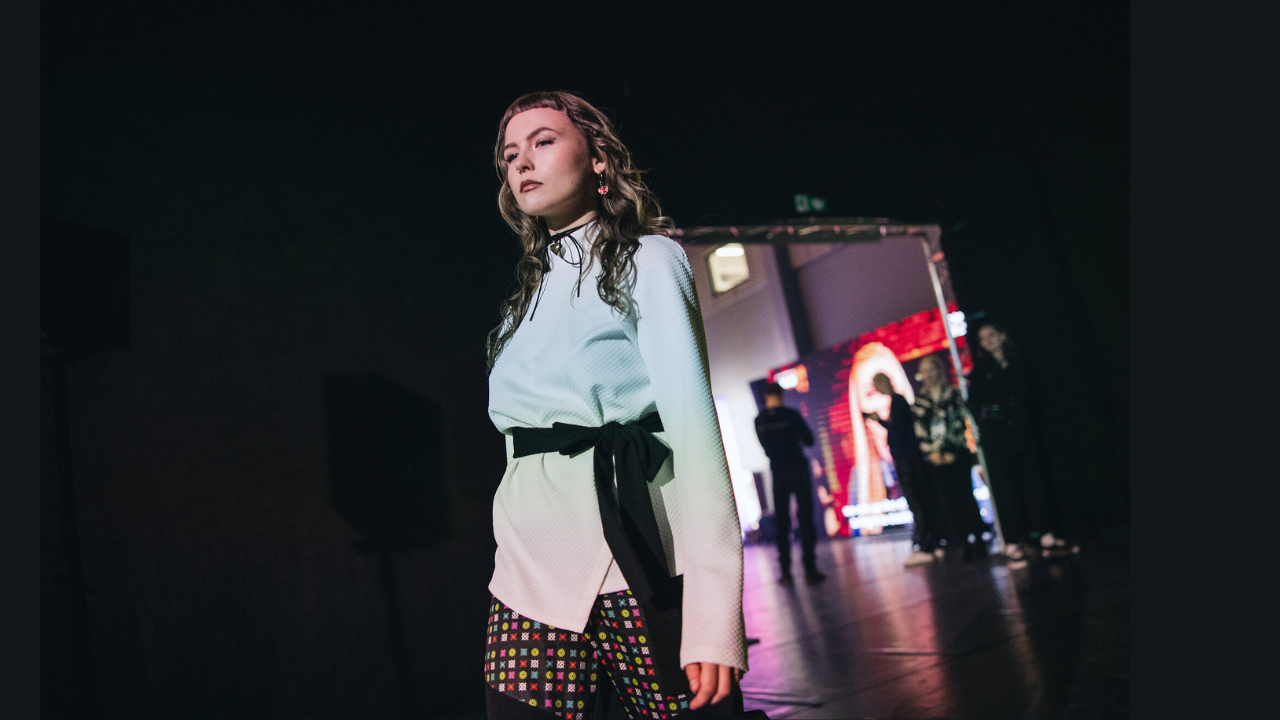
Dress for Success: Estonian Fashion and Corporate Branding
28.02.2024
Tartu Centre for Creative Industries hosted at sTARTUp Day 2024 a panel discussion titled “Dress for Success: Estonian Fashion and Corporate Branding”....
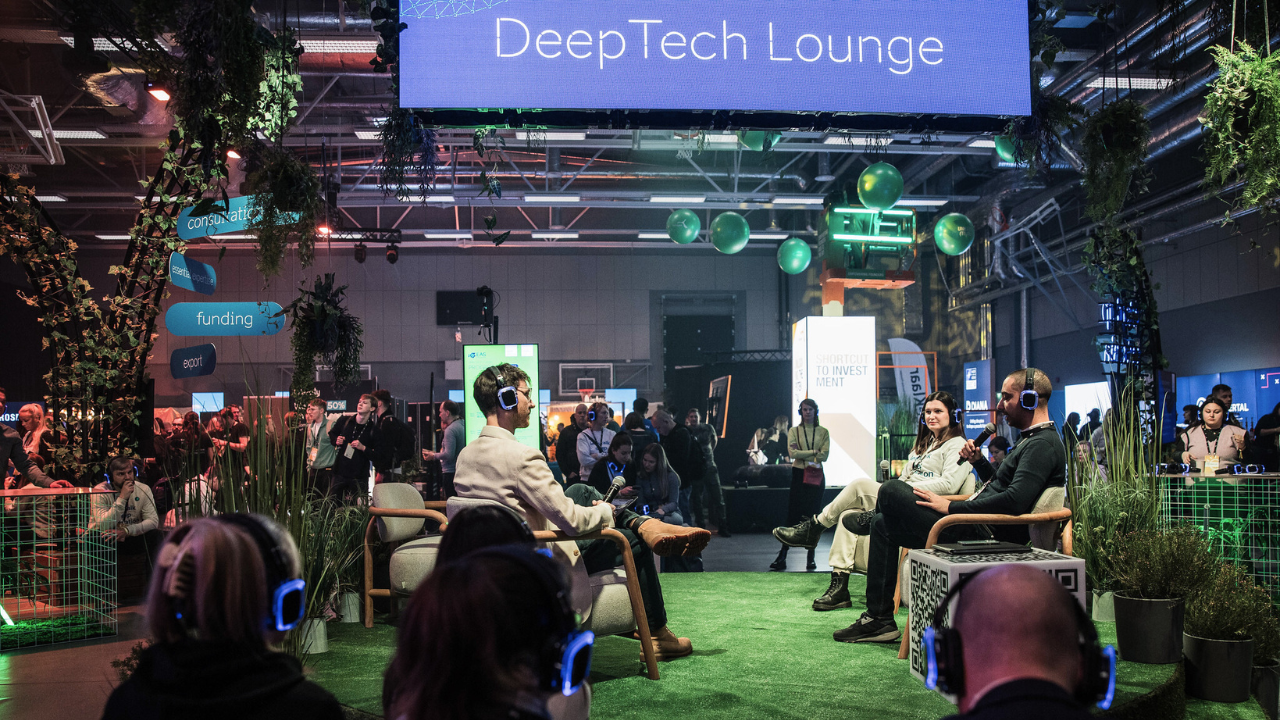
Startup Estonia Deep Tech Lounge offered insights for deep tech founders
15.02.2024
For the second time at sTARTUp Day, Startup Estonia hosted the hugely popular Deep Tech Lounge, featuring engaging conversations with experts and...
